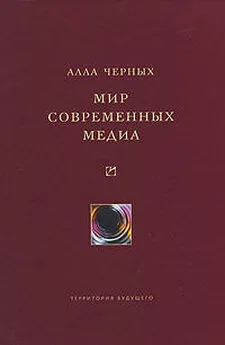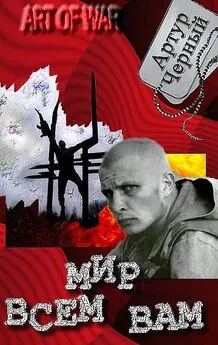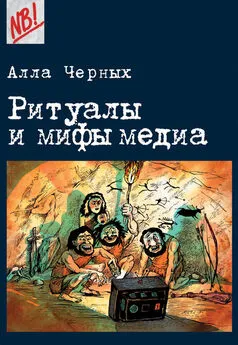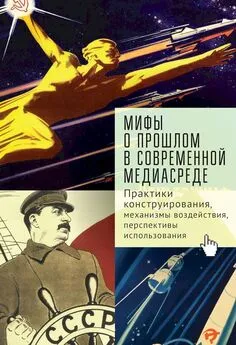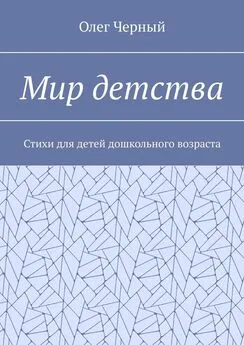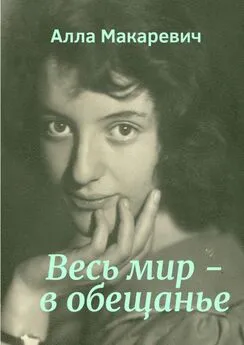Алла Черных - Мир современных медиа
- Название:Мир современных медиа
- Автор:
- Жанр:
- Издательство:Литагент «Территория будущего»19b49327-57d0-11e1-aac2-5924aae99221
- Год:2007
- Город:Москва
- ISBN:5-91129-037-5
- Рейтинг:
- Избранное:Добавить в избранное
-
Отзывы:
-
Ваша оценка:
Алла Черных - Мир современных медиа краткое содержание
Что такое современные медиа, ориентированные на производство и распространение специфического продукта – информации, в условиях ее коммодификации, т. е. превращения в товар? В чем специфика новостей и особенности их подачи, каковы механизмы формирования повестки дня? Каковы основы столь мощного воздействия медиа на современного человека и как понимать «медиатизацию» культуры и ее влияние на процессы художественного творчества? Что представляет собой «виртуальная реальность» и каковы социально-психологические последствия «погружения» в нее? Как изменяются роли и функции журналиста, вытесняемого блоггером, в новом информационном пространстве электронных СМИ? Что реально стоит за метафорой «четвертой власти» и каковы основы реальной власти СМИ в условиях медиатизации политики? Какова достойная позиция интеллектуала в отношении медиа, узурпировавших сферу не только публичного права, но и «право знать»? На все эти и многие другие вопросы отвечает эта книга.
Мир современных медиа - читать онлайн бесплатно ознакомительный отрывок
Интервал:
Закладка:
Ferguson M. (ed.) Public Communication: the New Imperatives. Future Directions of Media Research. London: Sage, 1990.
Ferguson M. The mythology about globalization // European Journal of Communication. 1992. № 7.
Fishman M. Manufacturing the News. Austin, tx: University of Texas Press, 1980.
Fiske J. Introduction to Communication Studies. London: Routledge, 1982.
Fiske J., Hartley J., O’Sullivan D., Saunders D. Key Concepts in Communication. London: Methuen, 1983.
Fiske J. Televisin Culture. London: Methuen, 1987.
Fiske J. Power Plays, Power Works. London; N. Y.: Verso, 1993.
Flichy P. Dynamics of Modern Communication: The Shaping and Impact of New Communication Technology. London: Sage, 1995.
Fowler R., Hodge В., Kress G., Trew T. Language and Control. London: Routledge and Kegan Paul, 1979.
Foucault M. LArchйology du Savoir. Paris: Gallimard, 1969 (русск. пер.: Фуко М. Археология знания. Киев: Ника-центр. 1996).
Fukuyama F The end of History? // The National Interest. 1989. № 16 (Summer).
Gane M. (ed.) Baudrillard Live. Selected Interviews. London and N. Y: Routledge, 1993.
Gans H. J. Deciding What’s News: The Study of cbs Evening News, nbc Nightly News, Newsweek and Time, N. Y: Vantage, 1979.
Garfinkel H. Studies in ethnomethodology, Englewood Cliffs, N. Y: Prentice Hall, 1967.
Gebner G. Mass Media and Human Communication Theory // Dance F. E. X. (ed.) Human Communication Theory. N. Y: Holt, Rinehart and Winston, 1967.
Gerbner G., Cross L., Morgan M., Signorelli N. Growing up with television: The cultivation perspective // Bryant J., Zillmann D. (eds.) Media effects: Advances in theory and research. Hillsdale, N. Y: Lawrence Eribaum Associates, 1994.
Geertz C. The Interpretation of Cultures. N. Y: Basic Books, 1973.
Giddens A. The Constitution of Society. Cambridge: Polity Press, 1984.
Glasgow University Media Group. Bad News. London: Routledge and Kegan Paul, 1976.
Glasgow University Media Group. More Bad News. London: Routledge and Kegan Paul, 1980.
Glasgow University Media Croup. Really Bad News. London: Writers and Readers, 1982.
Glasgow Media Group. Getting the Message. News, Truth and Power. London and N. Y.: Routledge, 1993.
Golding P., Labov P. Making the News. London: Longman, 1979.
Gouldner A. Ideology, culture apparatus, and new industry of reason // Alexander J. C, Seidman S. (eds) Culture and Society: Contemporary Debates, Cambridge University Press, 1993.
Graber D. Processing the News. N. Y.: Longman, 1984.
Grice H. Logic and conversation // Cole P., Morgan J. (eds.) Syntax and Semantics, 3: Speech Acts. N. Y.: Academic Press, 1975.
Gumperz J. Discourse Strategies. Cambridge: Cambridge University Press, 1982.
Gumperz J., Hymes D. Directions in Sociolinguistics. The Ethnography of Communication. N. Y: Holt, Rinehart and Winston, 1972.
Gurevitch M., Bennett T., Woollacott J. (eds.) Culture, Society and Media. London: Methuen, 1982.
Gurevitch M., Bllumler G. Political Communication Systems and Democratic Values // Democracy and Mass Media. Cambridge, 1990.
Habermas J. Strukturwandel der Цffentlichkeit. Neuwied: Luchterhand, 1962.
Hall S. et al. Policing the Crisis. London: Macmillan, 1978.
Hall S., Hobson D., Lowe A., Willis P. (eds.) Culture, Media, Language. London: Hutchinson, 1980.
Hall S. The Polity Reader in Cultural Theory. London: Macmillan, 1994.
Hall S. Notes on Deconstructing the «Popular» // Storey J. (ed.) Cultural Theory and Popular Culture: A Reader. Prentice Hall, 1998.
Hunt M. The Compassionate Beast. N. Y: Anchor Books, 1990.
Hart R. P. Seducing America. How Television Charms the Modern Voter. N. Y: Oxford University Press, 1994.
Hartley J. Understanding News. London, N. Y: Routledge, 1982.
Hartley J. The Politics of Pictures: The Creation of the Public in the Age of Popular Media. N. Y: Routledge, 1992.
Henshel R. L. Definitions by the Mass Media // Richard L. Henshel, Robert K. Merton. Thinking About Social Problems. Orlando: Harcourt Brace Jovanovich, 1990.
Herman E. S., Chomsky N. Manufacturing Consent. The Political Economy of the Mass Media. London: Vintage, 1994.
Hilgartnen S., Bosk C. The Rise and Fall of Social Problems: A public arenas model // American Journal of Sociology. 1988. Vol. 94. № 1 (July).
Hillis К. A geography of the eye: The technologies of virtual reality // Cultures of Internet: Virtual spaces, real histories, living bodies/ Ed. by R. Shields. London: Sage, 1996.
Hoffe W. L., Jesch J. Sprechwissenschaft und Kommunikation. Dusseldorf, 1972.
Hoffman M. Is Altruism Part of Human Nature? // Wakefield J. C. (ed.) Is Altruism Part of Human Nature? Social Service Review. 1993. Vol. 67 (September).
Hood S. The Politics of Television // Mc Quail D. (ed.) Sociology of Mass Communications. Harmondsworth, 1972
Hovland C. I., Lumsdaine A. A., Sheffield F. D. Experiements in Mass Communication. Princeton, N. Y.: Princeton University Press, 1949.
Huff D. How to lie with statistics. N. Y.: W. W. Norton, 1954. Inglis F. Media Theory: An Introduction. London, 1990.
Jackall R. (ed.) Propaganda. N. Y: New York University Press, 1995.
Jamieson K. H., Campbell K. K. The interplay of infl uence: News, advertising, politics, and the mass media. Belmont, CA: Wadsworth, 1992.
Janowitz M. The Study of Mass Communication // International Encyclopedia of the Social Sciences. Vol. 3. N. Y: Macmillan and Free Press, 1968.
Jensen K. B., Jankowski N. W. (eds.) A Handbook of Qualitative Methodologies for Mass Communication Research. London: Routledge, 1991.
Jones J. M. Prejudice and racism (2nd ed.) N. Y: McGraw-Hill, 1997.
Journalism. Theory, practice and criticism/Ed. by M. Bromley, H. Tumbler, B. Zelizer. 2000, № 1.
Kang N., Choi J. H. Structural implications of the crossposting Network of International News in cyberspace // Communication Research. 1999. Vol. 26. № 4. (August).
Katz E., Lazarsfeld P. Personal Infl uence. Glencoe, Ill.: Free Press, 1955.
Katz E., Szecsko T. (eds.) Mass Media and Social Change. London: Sage, 1981.
Katz Е. The End of Journalism? Notes on Watching the War // Journal of Communication. 1992. № 42 (3).
Keane J. The Media and Democracy. Cambridge: Polity Press, 1990.
Kellner D. Media Culture. Cultural Studies, Identity, and Politics between Modern and Postmodern. London and N. Y.: Routledge, 1995.
Kellner D. Baudrillard: A Critical Reader. Oxford: Basil Blackwell, 1994.
Kent R. (ed.) Measuring Media Audiences. London: Routledge, 1994.
Kinnick K. N., Krugman D. M., Cameron G. T. Compassion Fatigue: Communication and Burnout toward Social Problem // Journalism and Mass Communication Quarterly. 1996. Vol. 73. № 3 (Autumn).
Klapper T. The Effects of Mass Communication. Glencoe, Il.: Free Press, 1960.
Kollock P. The Economies of on-line cooperation: Gifts and public goods in cyberspace // Communities in cyberspace/Ed. by P. Kollock, M. A. Smith. London, N. Y: Routledge, 1999.
Kollock P., Smith M. A. Communities in cyberspace: Introduction // Communities in cyberspace/Ed. by P. Kollock, M. A. Smith. N. Y.: Routledge, 1999.
Kraus S. Televised presidential debates and public policy. Hillsdale, N. Y: Lawrence Eribaum Associates, 1988
Kubey R. Television and the quality of life: How viewing shapes everyday experience. Hillsdale, N. Y: Lawrence Eribaum Associates, 1992.
Labоv W. Language in the Inner City. Philadelphia: University of Pennsylvannia Press, 1972.
Labov W. Speech actions and reactions in personal narrative // Tannen D. (ed.). Analyzing Discourse: Text and Talk. Washington, dc: George Town University Press, 1982.
Laclau E., Mouffe C. Hegemony and Social Strategy: Towards a Radical Democratic Politics. London: Verso, 1985.
Laclau E. The populist Reason. London: sage, 2003.
Larrain J. Ideology and Cultural Identity: Modernity and the Third World Presence. London: Polity Press, 1994.
Larsen O. N. (ed.) Violence and Mass Media. N. Y, London: Harper & Row, 1968.
Lasswell H. D. The structure and function of comminication in society // Brison A. (ed.) The Communication of Ideas. N. Y.: Harper & Brothers, 1948.
Lasswell H. Propaganda // Jackall R. (ed.) Propaganda. N. Y.: New York University Press, 1995.
Lazarsfeld P., Berelson B., Gaudet H. The People’s Choice: How the Voter Makes Up His Mind in a Presidential Election. N. Y: Colambia University Press, 1948.
Lazarsfeld P. F., Merton K. Mass Communication, popular taste and organized social action // Brison A. (ed.) The Communication of Ideas. N. Y: Harper & Brothers, 1948.
Lenart S. Shaping Political Attitudes. The Impact of Interpersonal Communication and Mass Media. Sage publications, 1994.
Levy P. L’Intellegence collective: pour un fnthropologie du cyberspace. Paris: La Decouverte, 1994.
Liebes T., Katz E. The Export of Meaning: Cross-Cultural Reading of «Dallas». Cambridge; Oxford: Polity Press, 1988.
Lindlof T. R. Qualitative Communication Research Methods. Sage publications, 1995.
Lippman W. Public Opinion. N. Y: Harcourt Brace, 1922 (русск. пер.: Липпман У Общественное мнение. М.: Институт Фонда «Общественное мнение», 2004).
Livingston S. Why people watch soap opera: an analysis of the explanations of British viewers // European Journal of Communication. 1988. № 31 (1).
Lowery S., DeFleuer M. Milestones in Mass Communication Research. Media Effects. 3 ed. N. Y: Longman, 1995.
Luhmann N. The Concept of Society // Thesis 11. 1992. № 31.
Lull J. World Families Watch Television. London; Thousand Oaks; New Delhi: Sage, 1987.
McBride S. et al. Many Voices, One World. Report by the International Commission for the Study of Communication Problems. Paris: unesco; London: Kogan Page, 1980.
Martin R., Miller T. (eds.) SportCult.University of Minnesota Press, 1999.
Martin-Barbero J. Communication, Culture and Hegemony: From Media to Mediations. London; Newbury Park; New Delhi: Sage, 1993
Mattelart A. Multinational Corporations and the Control of Culture. Sussex: Harvester Press, 1979.
Mattelart A., Mattelart M. Theories of Communicatiom. A Short Introduction. London: Sage Publications, 1998.
Maynard D. W. Language, Interaction and Social Problems // Social Problems. 1988. Vol. 35.
McCombs M. E., Shaw D. L. The evolution of agenda-setting research: Twenty-five years in the marketplace of ideas // Journal of Communication. 1993. № 43 (2).
McCombs M. E., Shaw D. L., Weaver D. (eds.) Communication and democracy: Exploring the intellectual/rentiers in Agenda-setting Theory. Mahwah, N. Y.: Lawrence Eribaum Assaciates, 1997.
McQuail D. (ed.) Sociology of Mass Communication. Harmonds-worth: Penguin, 1972.
McQuail D. Mass Communication and Public Interest: Towards Social Theory for Media Structure and Performance // Communication Theory Today. Ed. by Crowley D., Mitchell D. London: Polity Press, 1994.
McQuail D. Mcquail’s Mass Communication Theory: An Introduction. London: Sage, 4th ed. 2004.
McQuail D. Media Performance. Mass Communication and the Public Interest. London: Sage, 1992.
MсLauahlin M. Conversation. How Talk is Organized. Beverly Hills; London: Sage. 1984.
McLuhan M. The Gutenberg galaxy: The making of typographic man. Toronto: University of Toronto Press, 1965 (русск. пер.: Мак-Люэн М. Галактика Гутенберга: Сотворение человека печатной культуры. Киев: Ника-центр, 2004).
Читать дальшеИнтервал:
Закладка:
